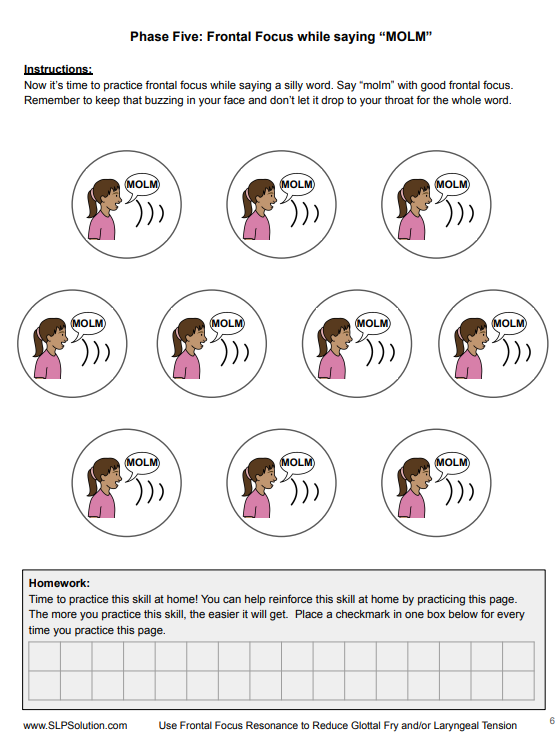Voice Therapy for Children | Pediatric Voice Therapy Activities
How can we help children with voice disorders such as vocal nodules?
What activities and exercises can we use to improve vocal patterns for children and teens?
On this page, we’ll go over some awesome strategies for keeping voice therapy fun for children and teens who need to reduce vocal trauma and improve voice patterns.
How to Keep Voice Therapy Fun for Children and Teens
Let’s take the “scary” out of treating voice disorders in children! Children with vocal nodules or polyps don’t usually get to have fun materials to help reduce poor voice patterns and phonotrauma. Plus, we don’t always feel competent in treating voice disorders because, let’s be honest, grad school was a long time ago! Kristie Knickerbocker from A TEMPO Voice Center joins us in this video to share 5 fun tips for working with pediatric voice clients.
Below are the links to the products that were talked about in the Speechie show:
- A TEMPO Voice Center: http://www.atempovoicecenter.com/
- Vocal Hygiene Bookmarks: https://www.teacherspayteachers.com/Product/Back-to-School-Freebie-Vocal-Health-Bookmarks-2686260
- Bubbles in a Cup: https://www.teacherspayteachers.com/Product/Voice-Therapy-Cup-Bubbles-2473247
- Straw Phonation Activity Cards: https://www.teacherspayteachers.com/Product/Voice-Therapy-Mountain-Climbers-2475198
- Birthday Candle Breathing Activity: https://www.teacherspayteachers.com/Product/Voice-Fluency-Birthday-Candle-Breathing-2966412
- Voice in a Jiff: Pediatric Activity Book and Manual: https://www.teacherspayteachers.com/Product/Voice-Therapy-For-Kids-Voice-in-a-Jiff-Pediatric-2982521
Listen to the audio version of the Speechie Show, click here:
5 Practical Tips for Treating Voice Disorders in Children:
Featuring Carrie Clark and Kristie Knickerbocker on The Speechie Show
Working with children who have voice disorders can feel intimidating, especially if it’s been a while since grad school. In this episode of The Speechie Show, Carrie Clark chats with Kristie Knickerbocker of A Tempo Voice Center, who shares five straightforward strategies to make therapy more effective and engaging.
1. Flow Phonation
Flow phonation helps children who squeeze their vocal folds too tightly. Kristie suggests using a simple visual like a torn strip of tissue. The child practices blowing air and gradually adding about 20 percent voice, then moves into words and sentences. The goal is smooth, easy voicing without tension.
Always begin after ENT clearance to avoid further vocal-fold damage.
2. Vocal Health and Hygiene
Hydration—both inside and out—is key. Kristie recommends limiting exposure to second-hand smoke, avoiding caffeine, and teaching kids not to yell for long periods. Her free printable bookmarks make vocal-hygiene reminders fun and age-appropriate.
3. Straw Phonation
Using a straw in a cup of water, children blow bubbles and add sound to reduce tension and improve coordination. Kristie advises medium-diameter straws and creative touches—colored water or glitter (without sipping!)—to keep practice playful and consistent.
4. Resonant Voice Therapy
Resonant voice focuses on forward, facial vibration rather than throat tension. Starting with humming helps children feel the buzz in their nose and cheeks. Kristie demonstrates moving between back-of-throat and forward hums so kids can sense the difference, then transfer the skill into words and conversation.
5. Reducing Phonotraumatic Behaviors
Phonotrauma happens when vocal folds collide too hard or too often—like with shouting, throat clearing, or harsh coughing. Teach diaphragmatic “birthday-candle” breathing: inhale to expand the belly, exhale while gently tightening the abs, and speak on that relaxed breath. Games that measure how long a child can speak on one breath make practice motivating.
A Structured Curriculum for Treating Voice Disorders in Speech Therapy:

About the Author: Carrie Clark, MA CCC-SLP
Hi, I’m Carrie! I’m a speech-language pathologist from Columbia, Missouri, USA. I’ve worked with children and teenagers of all ages in schools, preschools, and even my own private practice. I love digging through the research on speech and language topics and breaking it down into step-by-step plans for my followers.
Connect with Me:




I just wanted to clarify- the Voice & Fluency Birthday Candle Breathing, Cup Bubbles, and Voice Therapy Mountain Climbers are all included in the Voice in Jiff book? Or are they all sold separately?
Hi, Christina-
I believe they may be two separate items. Here is the direct link for Voice in Jiff book and here is the direct link for the birthday candle breathing activity.